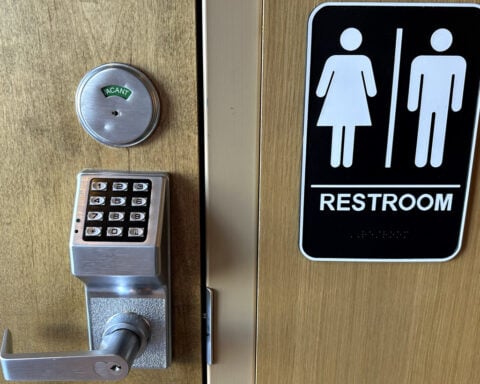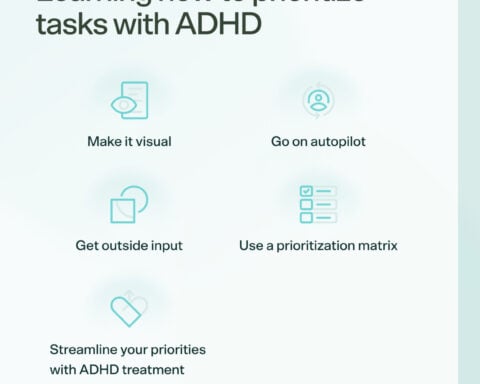Mary Johnson consistently starts her workday by kindly greeting her coworkers with a energetic "Good morning!" Her demeanor at meetings is characterized by laughter and humor, praising others, and offering positive motivation. Following work, she joins friends for supper and a movie, engaging in lively conversation and expressing joy while discussing the film. She enjoys cozying up with her children at home, reading them bedtime stories with a joyful expression on her face.
At times, after the children have gone to bed, Mary finds solace in the bathroom, where she spends hours shedding tears, overwhelmed by a profound melancholy. She considers the possibility of taking her life and even begins writing a suicide note, yet ultimately chooses to keep it hidden once more. The following day, she smiles again, giving the impression that all is well.
Mary suffers from what experts call "smiling depression." Unlike stereotypical manifestations where someone looks as depressed as they feel, smiling depression involves displaying outward happiness despite inner pain. Sufferers hide their true feelings under a facade, keeping their depression invisible. This disconnect between how one looks on the outside versus the inside is the hallmark of smiling depression.
"People with smiling depression seem happy, even upbeat, on the surface, yet are struggling with the same severe depression symptoms as anyone clinically diagnosed with major depressive disorder," said Dr. Michelle Beauchamp, a psychologist at UC San Diego Health specializing in mood disorders. "They are able to put on a smile to the world while roiling inside with all the turmoil and anguish of depression."
It is worth noting that smiling depression is not officially classified as a disease in the DSM - Diagnostic and Statistical Manual of Mental Disorders. However, the term accurately describes how some with depression present themselves.
"The 'smile' is essentially a mask, used to convince themselves and others that everything is okay even when it's not," she explained. This mask makes their depression especially difficult for friends and family to detect.
Mary Dubin, a therapist who runs a private practice in Los Angeles, said it's not uncommon for partners and loved ones to feel shocked and blindsided if someone they know well is diagnosed with severe depression.
"They'll say, 'But she was always so happy!' not realizing that was just a facade," Dubin remarked. "Smiling depression can be very convincing."
So why do some hide their pain behind smiles? Experts suggest several reasons. For some, it's an inherent trait embedded since childhood.
"From a young age, they learned to put on a cheerful face no matter what was happening internally," said psychiatrist Dr. Andrew Crawford. "They became adept at displaying emotions expected of them versus what they authentically felt."
For others, the motive is more strategic.
"Presenting a happy facade keeps difficult questions at bay," Beauchamp said. "They may fear that being open about their depression could negatively impact their relationships or career. So they hide any signs that could be stigmatizing."
Indeed, stereotypes that depressed individuals are "weak" or that mental illness indicates a flawed character persist in some segments of society. This contributes to feelings of shame around depression that smiling sufferers may try to avoid by not looking "depressed."
Still, the illusion is seldom perfect. Trained experts can sometimes detect minor discrepancies.
"A smiling depressed patient may have perfected seeming happy, but their eyes betray them, revealing sadness and fatigue," said psychiatrist Dr. Veronica Thomas. "Or the smile seems slightly off, not reaching their eyes. There are often little cracks in the facade."
The disconnect between inner turmoil and outer cheeriness can feel profoundly disorienting for the individual suffering behind an outward smile.
"People with smiling depression describe it as terribly lonely," said clinical psychologist Dr. Harold Barrows. "Outwardly, everything seems fine, reinforcing the feeling that they should be happy. But inside, they feel empty, even suicidal. It's very confusing."
Barrows said smiling depressives will often immerse themselves in helping others as a way to justify their sadness in contrast to the blessings in their lives. However, no amount of smiling through the pain alleviates the crushing weight of major depressive disorder.
Untreated depression, smiling or not, carries significant dangers. Suicide claims tens of thousands of lives in the U.S. annually, and smiling depression may be associated with higher suicide risk in some individuals.
"The stark split between public happiness and private suffering creates strong cognitive dissonance for some," Barrows explained. "They wonder, 'Why can't I just be happy for real when my life looks so great on the outside?' These thoughts could worsen suicidal ideation in those prone to such thoughts."
Medical experts emphasize the importance of recognizing symptoms to get people with smiling depression to get treatment.
"Just because someone is smiling doesn't mean everything is okay," stressed Beauchamp. "We need greater public awareness that depression can hide behind a smiling face."
In treating smiling depression, a multifaceted approach is used, as with any major depressive disorder. Medications like antidepressants are frequently prescribed to correct chemical imbalances contributing to depressive feelings. Psychotherapy helps patients address distorted negative perceptions, manage stressors, and develop coping strategies. Support groups provide community, helping eliminate loneliness.
With treatment, the façade of smiling depression does eventually give way to authentic happiness from healing. Mary receives help and now feels true joy. Her smile lights up as she greets her coworkers. Her laughter during meetings is heartfelt, not merely decorative. She engages sincerely with friends over dinner. At home with her kids, her delight is genuine.
The mask has fallen away, revealing the beautiful soul it once obscured.
The story of Mary Johnson, while an illustrative composite case study, reflects the genuine suffering of countless individuals coping silently with depression behind smiles. The disconnect between cheerful appearances and inner turmoil creates a profound sense of isolation.
"People with smiling depression often feel utterly alone," said clinical psychologist Dr. Paula Stanbridge. "Outwardly, everything seems fine - they may have close relationships and successful careers. So why would they be depressed? Even they wonder why they don't feel happier."
This lonely confusion compounds already severe depression symptoms like emptiness, worthlessness, suicidal thoughts, and more. And yet the curtains remain drawn, emotional pain hidden away.
What drives individuals to obscure major depressive disorder behind the veil of a smile?
"The motives vary but often circulate around shame and fear of judgment," psychiatrist Dr. Timothy Nolan explained. "There's still a false stigma that depression indicates weakness or a character flaw. People worried about such judgments may force smiles as a self-preserving act."
Sociologist Dr. Lauren Bright conducted a study on mental health attitudes, discovering persistent biases.
"We presented case descriptions of people with identical symptoms. The only difference was one smiled in photos while the other didn't," Bright said. "Participants viewed the non-smiling figure as more mentally ill despite the same symptoms."
This underscores the stigma around visible depression that wears down smiling sufferers until they mask duress to appear "normal."
Of course, those with smiling depression do not always fool loved ones. Milwaukee teacher Susan Chang recalls bewildering changes in her usually vibrant father Eric during his fifties: laughing less, losing interest in favorite hobbies, displaying fleeting grimaces when he thought no one noticed.
"But whenever we asked Dad what was wrong, his thousand-watt smile would flash as he said everything was great," Chang remembered. "It was so confusing. He seemed happy but somehow... wasn't."
Tragically, Eric Chang took his own life at 58, even as his smile never faltered. Only after his shocking suicide did the depths of his secret suffering emerge.
"We felt almost tricked," said Susan Chang. "But we know now that Dad's smiling was just his way to cope."
This coping reflex fools even those fighting depression. 1908 Los Angeles nursing graduate Vivian Carrol kept an eloquent journal across decades until doctors analyzing her writings after her suspicious drowning suggested chronic low-grade depression.
"Yet Vivian described throwing dinner parties with much laughter and joy throughout," said literary historian Dr. Garrison Hull, who studied the journals. "She constantly wrote that life was 'so delightful, my smile ceaseless.' It seems Vivian deceived herself about her own depression."
Given such internal deception and external misperception around smiling depression, proper diagnosis and treatment remain challenged. Therapists emphasize looking for subtle tip-offs.
"A smiling patient's eyes may not match the cheeriness but betray profound fatigue and sadness," said clinical psychiatrist Dr. Zhang Wei. "Or the smile tight and tense rather than relaxed. Probe gently if you suspect an issue."
With a diagnosis, various treatments help individuals regain genuine happiness, the artificial smile fading. Powerful antidepressant medications can correct brain chemical imbalances driving depression. Cognitive behavioral talk therapy helps modify thought patterns and coping mechanisms. Support groups aid in alleviating the profound isolation of smiling depression.
"Treatment outcomes for smiling versus non-smiling depression are comparable," Zhang Wei assured. "The key is identifying those suffering quietly and compassionately convincing them to get the assistance they need."
Behind so many smiles around us, people may be privately struggling with severe depression. For those with smiling depression, the mask allows them to avoid the perceived stigma and judgment around mental illness. But under the façade, they battle the same debilitating symptoms of major depressive disorder, often feeling terribly alone and confused by their own lack of authentic happiness.
By raising awareness and showing support for those who suffer silently, we make it safer for them to unveil their pain to get lifesaving treatment. We help lift the veil on hidden suffering so that one day, all smiles shining around us will be unfettered expressions of true joy.

 What is seditious conspiracy, which is among the most serious crimes Trump pardoned?
What is seditious conspiracy, which is among the most serious crimes Trump pardoned?
 Savannah women brings hope and help with new Maternal Mental Health app
Savannah women brings hope and help with new Maternal Mental Health app
 Amazon to close 7 warehouses in the Canadian province of Quebec and eliminate 1,700 jobs
Amazon to close 7 warehouses in the Canadian province of Quebec and eliminate 1,700 jobs
 House prepares to pass immigrant detention bill that would be Trump's first law to sign
House prepares to pass immigrant detention bill that would be Trump's first law to sign
 Lewis Hamilton says driving a Ferrari F1 car for first time was 'exciting and special'
Lewis Hamilton says driving a Ferrari F1 car for first time was 'exciting and special'
 The head of a federal agency for consumers has packed up his office. But will Trump fire him?
The head of a federal agency for consumers has packed up his office. But will Trump fire him?
 Meagan Good says goodbye to 'Harlem,' hello to her future with Jonathan Majors
Meagan Good says goodbye to 'Harlem,' hello to her future with Jonathan Majors
 K-9's retirement party was everything a dog could want
K-9's retirement party was everything a dog could want
 Why some Instagram users aren’t able to unfollow Trump and JD Vance
Why some Instagram users aren’t able to unfollow Trump and JD Vance
 Smiling Depression
Smiling Depression






